Warhammer 40,000: Rogue Trader review – honey, there’s a Warp Daemon in the trunk

Life is difficult in the future portrayed in Warhammer 40,000. Interstellar travel, to put it bluntly, sucks: You basically have to enter a purgatory plane where only daemons live which you’d get lost in forever if the breathing corpse of the God Emperor – who is barely kept alive by sacrificing 1,000 souls for him daily – doesn’t somehow lead you to your destination. Traversing the Warp is difficult enough – people go mad, you get caught up in temporal rifts, and other unpleasant things.
Which is why it’s incredibly inconvenient when you have a Psyker, a sort of magic user able to channel the power of the Warp, onboard who can’t control her bloody powers. Damn you, Idrila. During our latest jump she somehow invited a rather ill-mannered Tzeentch Daemon onto the ship, leading to losses among the crew and me having to go clean up her mess. She’s useful sometimes, being able to glean into the future, but I’ve had enough – after admitting that she was responsible for letting that daemon onboard, I execute her on the spot.
There probably was a deeper explanation for it, but I didn’t care to ask. As my friend Heinrix from the Inquisition would say: Innocence proves nothing.
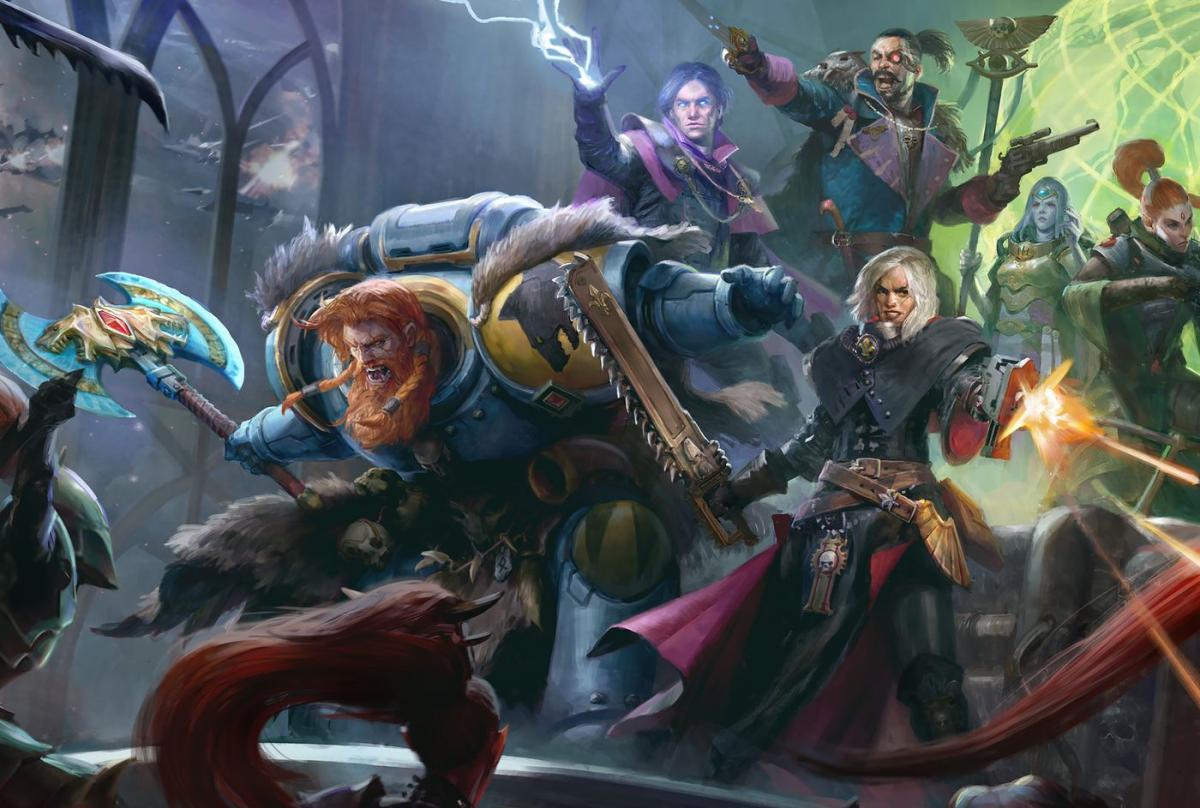
Most decisions you can make in Warhammer 40,000: Rogue Trader let the Dark Urge’s actions from Baldur’s Gate 3 look sane in comparison. Owlcat’s newest CRPG definitely hits the tone of this grimdark universe, in which humanity is beset by enemies from outside and within and has become a force that itself would be the big bad evil of most other settings – here it’s like a mid-tier evil on the evilness scale.
As the titular Rogue Trader, a sort of hereditary merchant king, you have a lot more freedom than most people, thanks to an imperial Warrant of Trade being bestowed upon your dynasty. You can get away with things that would get anyone else executed on the spot – like talking to aliens and keeping around unsanctioned Psykers like Idrila. Rogue Traders rule their own colonial fiefdoms as dictators, expanding their reach by exploring unknown space, and thus gradually increasing the size and influence of the Imperium of Mankind.
Inheriting the title, powers, and responsibilities of a Rogue Trader early in the game, it’s up to you how to fulfill the role, though there are generally three routes to take: You can be a brave and kind Iconoclast who cares about the people, a Dogmatist who adheres to the Imperium’s principles, or a Heretic that flirts with the ruinous powers. Repeatedly choosing dialog options marked with any of these paths will increase your ranking in them, unlocking special equipment down the line and endearing you to the companions following the same route. As mentioned above, decisions have a huge scale in Rogue Trader. You can execute companions. You can exterminate entire planets. You have the power to do so and no one will tell you otherwise – even the almighty Inquisition has to think twice about crossing a Rogue Trader.
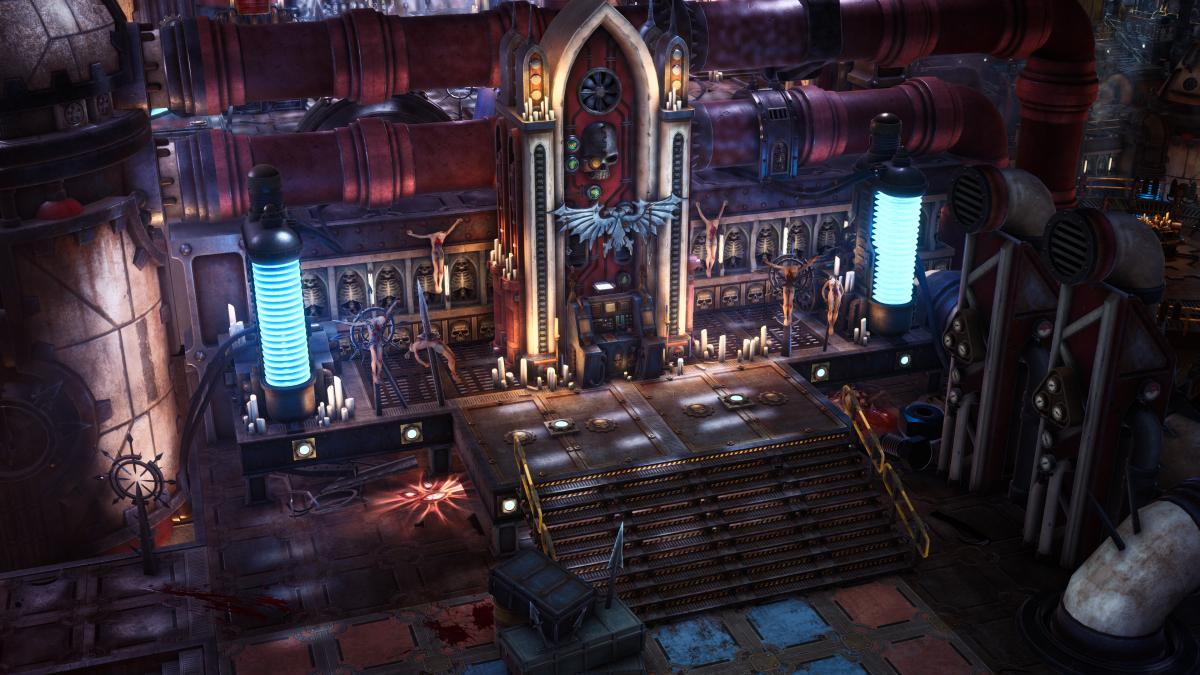
I wish those consequences would reflect a bit more on the narrative, though. After getting rid of Idrila, I visited my other companions to see if they had anything to say about it – but they didn’t. Sure, I can’t access her personal quests anymore or use her in battle, which are consequences that are direct and real, but none of the people who knew her had any thoughts or reactions to what I did. It just makes everyone seem less real, which is a shame. Things were a bit better with the whole blowing-up-a-planet affair, which continued to be referenced by people.
In general, though, the companions you pick up on your travels as well as the overall narrative of Rogue Trader are all very engaging – there are ups and downs, certainly. It’s not a consistent experience. Presentation-wise, of course, it doesn’t hold a candle to that Game of the Year I can’t stop referring to. Voice-acting is present, but relatively sparse, and most of the story is presented in walls of text. The visuals are fine for the most part, though characters can look pretty janky: Cassia looks nothing like her beautiful portrait artwork, for example. The music is pretty great, though. You’ve got a wide range of styles from the typical church-like hymns and organs we all associate with Warhammer 40,000 now, to tracks that are at home on a metal album.
Rogue Trader does a solid job of introducing the setting to people new to it, offering mouse-over tooltips to explain highlighted terms and having characters act as guides to certain topics – as I am relatively well versed in Warhammer 40,000, I can’t really judge if all that is overwhelming to newcomers, though. I imagine it would be.
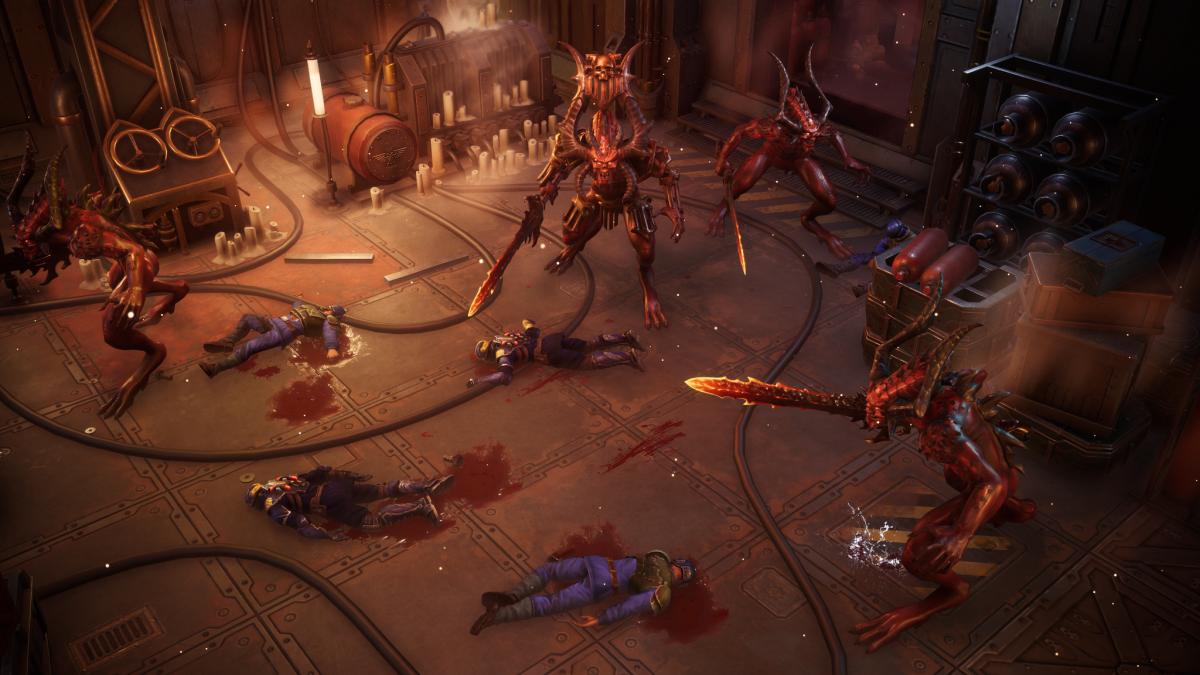
Speaking of overwhelming: I suck at math and it sometimes felt like I needed a major in the subject to fully understand what my characters’ abilities do. Descriptions showed complex formulas to calculate skill effects and damage numbers, instead of simply telling me what those numbers would be based on the current stats – however, it seems like a post-release update has actually changed the descriptions to be easier to read. You now find concrete numbers based on your current stats and can expand the tooltip to see the formulas. I still see some descriptions doing it the old way, but those are probably leftovers that will be dealt with later. Good on Owlcat for addressing these concerns immediately after launch.
Abilities, of course, are a major factor in the game’s turn-based combat, which also features a cover system and hit chances, making it feel like XCOM. Battles are incredibly fun and each of the classes, called Archetypes, really have their own ways of contributing to them. My character is an Officer, who can buff companions and give extra turns, and then advanced to become a Grand Strategist. That class has the really cool ability to mark certain areas of the battlefield, which provide bonuses and can be further modified by stratagem abilities. Yrliet, an Aeldari you can recruit, is an amazing sniper dishing out tons of damage (which I exploit by having my Rogue Trader and Cassia giving her extra turns, essentially having her attack six times per turn cycle). Heinrix, an investigator from the Inquisition, is a Psyker I specialized as a healer along with dealing melee damage.
You need to be careful with Psykers, of course. Use their abilities too much and you’ll degrade the Veil – the borders between the Warp and the material world – so much that daemons can pop out and get you into big trouble. I’ve learned my lesson of this when a Screamer of Tzeentch showed up during a firefight in Chapter 1 and turned it from an easy into an incredibly hard-fought victory.
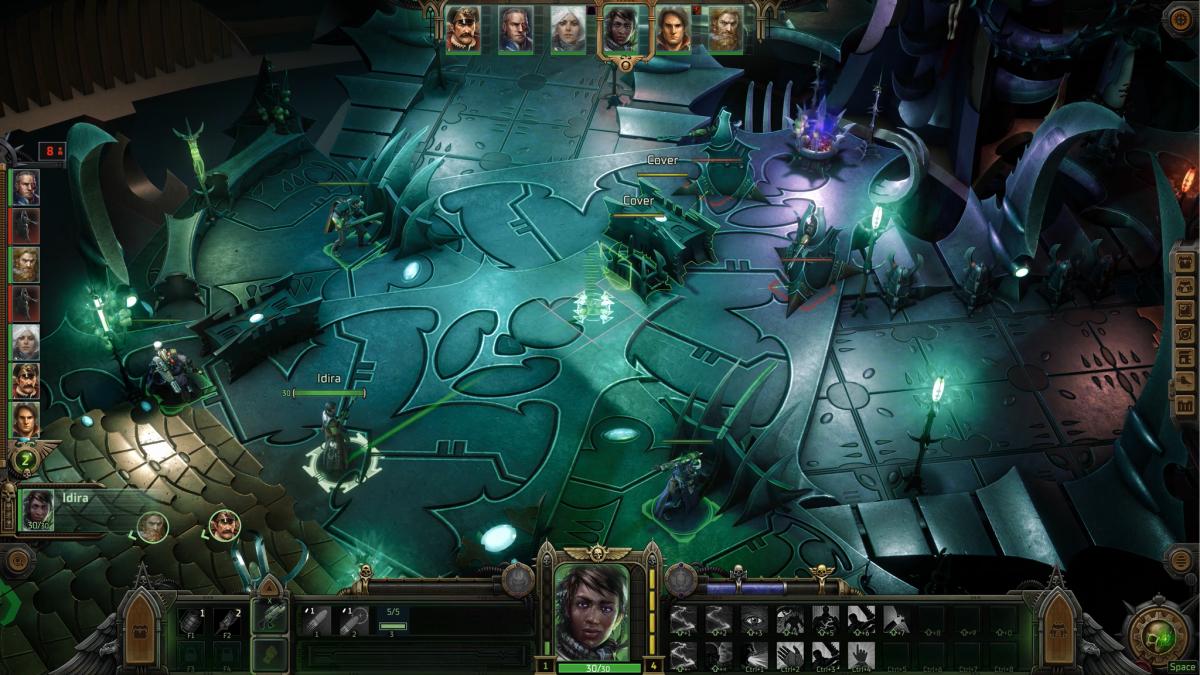
In short, Rogue Trader’s ground combat is excellent most of the time – it feels good, sounds good, and is suitably challenging and satisfying.
Enemy numbers, the amount of encounters, and balancing are always concerns with Owlcat – and none of these are perfect in Rogue Trader either, sadly. There’s a ton of enemies, which can really drag out fights you’re clearly winning, making them feel somewhat stale after a while – though it also gives you the opportunity to really unload the burst-fire modes of your weapons in a spectacular way – or can make battles feel absolutely unfair. There are also encounters that simply have no reason for being there in the first place, adding nothing to anything, and just seem to slow the pace of the game down because the developers seemingly feared that players would get bored if they couldn’t shoot anything for five minutes. At least there is an impressive array of difficulty options, which can help with some of these issues.
There are similar problems with the space combat, another turn-based battle mode. I like it in principle. It adds something different to the mix and certainly feels topical, but you’re often so outnumbered that you’re just sitting there watching the enemy pound your ship for way too long before you get to do something again. Why are there random slow-mo scenes when the enemy fires on my ship? It doesn’t look that spectacular. Perhaps giving us an escort ship or some fighters from the start or adding some terrain could help make this part more interesting – the only thing the space combat did for me was make me download Battlefleet Gothic: Armada 2 again.
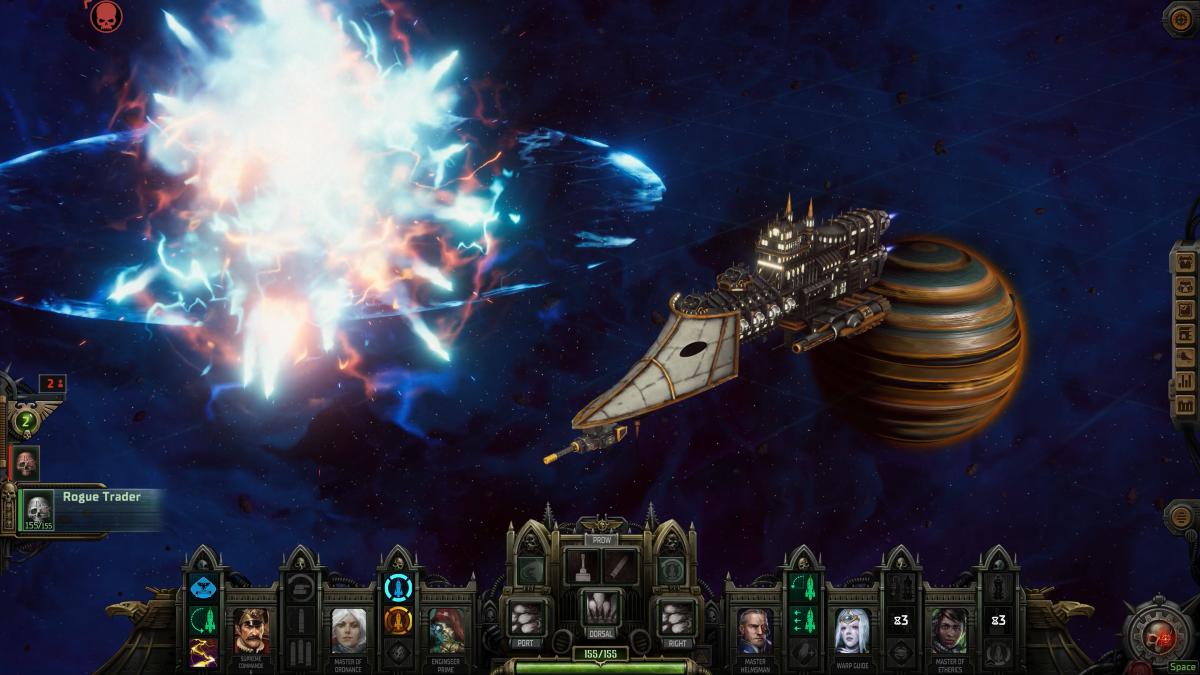
The other big gameplay piece, managing your little empire, I find quite enjoyable. You can place harvesters on worlds with resources and use these to build up your colonies, granting you even more resources, special items, permanent buffs, and faction reputation. In contrast to space combat, this mechanic doesn’t demand much of your time and feels more rewarding. As you expand your reach and increase your profit factor – essentially a metric for your wealth – and boost your reputation with the other factions in the Koronus Expanse, you can buy special equipment from them or gain access to special buildings for your colonies.
This mechanic in combination with the narrative really makes it feel like you are part of the loose power structure in this isolated sector of space, working with or against certain factions not just on a small scale, but in a big way befitting an autocrat.
All of this – great and flawed – is overshadowed by how buggy this game is. Without falling into exaggeration, I have not played a single session of Rogue Trader that was free of bugs. Some of these are small: Visual glitches of some textures, displaying some objects as violet shapes, models not using their legs when moving, models in the world not moving at all. After killing Idira, her name would randomly show up on the map as if she was haunting me. Those are not great, but can be overlooked.
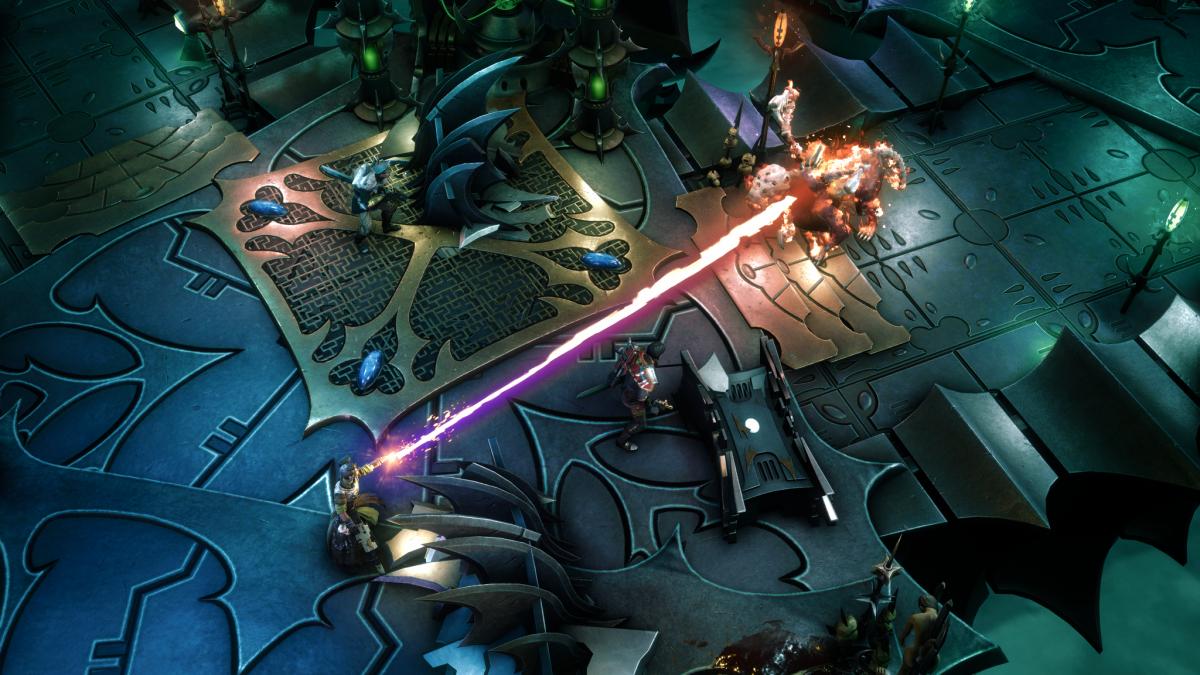
The game-breaking stuff cannot. I’ve had a bug that hindered me from looting anything, because it just didn’t want to show the UI for it, and one that slowed the game down so much I had to restart. I’ve had enemies partly spawn inside environments, making them stuck and unable to do anything. Sometimes you’re lucky enough to be able to save and reload and get it to work again. Sometimes, though, that won’t do and you can lose an hour or two of progress. Frustrating.
Warhammer 40,000 is such a great universe and being a Rogue Trader is probably one of the coolest experiences you can have in it – as such, I really want to love this game and want it to succeed, especially after Baldur’s Gate 3 brought such momentum to the genre. Owlcat has failed, for me at least, to make the most of this opportunity. I have confidence that this game will be a fantastic CRPG a year from now, if the developer puts in the effort to calm the machine spirits, but at the moment I simply can’t heartily recommend it to anyone that isn’t a fan of the studio’s previous games or a fellow Warhammer 40,000 nut, and that’s really a shame. I hate that I can’t stop playing it. Slaanesh is making me do it, I swear.
Score: 7/10
- Presentation: 7/10
- Story: 8/10
- Mechanics: 8/10
- Technical: 5/10
Version tested: PC.
